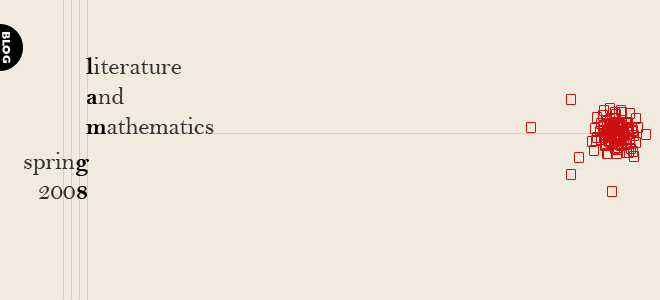Today Ana and I were interviewed by a writer from the New York Times who is writing an article about communities. She wants to write a chapter about math communities. This is exciting because the association is not often made, as we have discussed in class, between math and socializing. However, my experience as a math major has been the opposite (most of my friends are math majors and we throw awesome math parties!), and I am glad that perhaps she will provide a more accurate account of math and the average person who studies it. And, it turns out that her last book won the Pulitzer Prize!
I checked out a really cool book from the library that analyzes how mathematicians think and the common misconceptions people have about doing math. Most people have to study algebra, geometry, and at most, Calculus. The curriculum usually emphasizes the mechanical and computational aspect of these fields rather than the conceptual part. I know that it has been a long time since I have done any arithmetic. I always dread the question, “Hey, you’re a math major, what is 12039823497255 x 9870462395734?”
In some schools, math is considered a liberal art as opposed to a natural science. What makes this subject bridge these two rather disjoint categorizations?
I would like to add a few quotes from the book that I really like:
“What is missing is the creativity of mathematics…As people about mathematics and they will talk about arithmetic, geometry, or statistics, about mathematical techniques or theorems they have learned. They may talk about the logical structure of mathematics, the nature of mathematical arguments…Rarely, however, do most people mention the “doing” of mathematics when they talk about mathematics.”
“Mathematics has something to teach us, all of us, whether or not we like mathematics or use it very much. This lesson has to do with thinking, the way we use our minds to draw conclusions about the world around us.”
Monday, April 14, 2008
The Art of Math
Posted by
Lucia
at
6:29 PM
![]()
![]()
Subscribe to:
Post Comments (Atom)

6 comments:
Math is our brain’s most powerful tool as we try to interpret the universe.
Everyday.
Rock on!
Art of Math
I think it is a wonderful trend these days to emphasize the aesthetic aspect of math as opposed to the computational. As an artist, it wasn’t until I experienced the math aesthetic that my interest blossomed. Furthermore, it was due to math having a different aesthetic than art that made it so attractive. I think mathematicians should focus on the glory of the math aesthetic and quit leaning on the idea that math is an art. It is not subordinate to art and art is not subordinate to it.
I really enjoy your blog ... thanks!
Cheers,
Kaz
As an applied mathematician, I'd have to ask that we not be so quick to discount the computational aspect of mathematics. It is math's bread and butter.
haha! You should take a look at what Hardy thinks about applied mathematics... it's pretty harsh.
In regards to the post, I do think people really overlook how much creativity and ingenuity is required to do mathematics. I personally hate it when people think it's all formulas and calculations and you just follow some kind of guideline that the math god gave us and get the answer. A monkey can do that. Every branch of mathematics is interesting in its own right (including applied, Ian) and it requires an incredible amount of work and creativity to get anywhere with it. I do think it's an art...
Oops didn't mean to delete this...
Yeah it's a shame a lot of people don't end up getting exposed to the creative side of doing math. I'm a CS major and people often have the same ideas about CS, that it's all dry computational stuff with no creativity. But there's often a lot of creativity in writing algorithms in the same way that there is in writing a mathematical proof. I also really agree with that last quote, I think spending a lot of time studying math or CS does affect the way you reason about the world in general. Also don't let me miss the next math party.
Post a Comment